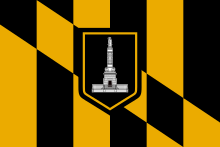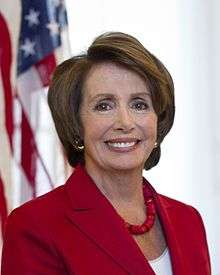Thomas D'Alesandro Jr.
Thomas Ludwig John D'Alesandro Jr. (August 1, 1903 – August 23, 1987) was an American politician who was a U.S. Representative from Maryland's 3rd congressional district (1939–47) and subsequently the mayor of Baltimore, Maryland (1947–59). He was the father of Speaker of the United States House of Representatives Nancy Patricia Pelosi, the first female Speaker of the House, and Thomas D'Alesandro III, also a mayor of Baltimore.
Thomas D'Alesandro Jr. | |
|---|---|
 | |
| 39th Mayor of Baltimore | |
| In office May 16, 1947 – May 16, 1959 | |
| Preceded by | Theodore McKeldin |
| Succeeded by | J. Harold Grady |
| Member of the U.S. House of Representatives from Maryland's 3rd district | |
| In office January 3, 1939 – May 16, 1947 | |
| Preceded by | Vincent Palmisano |
| Succeeded by | Edward Garmatz |
| Personal details | |
| Born | Thomas Ludwig John D'Alesandro Jr. August 1, 1903 Baltimore, Maryland, U.S. |
| Died | August 23, 1987 (aged 84) Baltimore, Maryland, U.S. |
| Political party | Democratic |
| Spouse(s) | Nancy Lombardi |
| Children | 6, including Thomas and Nancy |
Early life
D'Alesandro was born in Baltimore on August 1, 1903. He was the son of Maria Petronilla (née Foppiani) and Tommaso G. D'Alesandro, who were born in Montenerodomo, Abruzzo, Italy. D'Alesandro attended Calvert Business College in Baltimore. Before beginning his political career, he worked as an insurance and real estate broker.[1]
Career
A Democrat, D'Alesandro served as a member of the Maryland State House of Delegates from 1926 to 1933. After serving in Annapolis, D'Alesandro was then appointed as General Deputy Collector of Internal Revenue, a post in which he served during 1933–1934. He then was elected to serve on the Baltimore City Council from 1935 to 1938.
D'Alesandro was then elected to the 76th Congress and to the four succeeding Congresses, serving from January 3, 1939, until he resigned on May 16, 1947. While in Congress, D'Alesandro strongly supported the Bergson Group, a "political action committee set up to challenge the Roosevelt Administration's policies on the Jewish refugee issue during the Holocaust, and later lobbied against British control of Palestine" despite his equally strong support for Roosevelt's other policies.[2]
Following his service in Congress he was Mayor of Baltimore for 12 years from May 1947 to May 1959.[3] D'Alesandro served on the Federal Renegotiation Board from 1961-1969 after being appointed by President John F. Kennedy[1][4]
Political campaigns
D'Alesandro was a strong contender for Governor of Maryland in 1954, but was forced to drop out due to being implicated in receiving undeclared money from Dominic Piracci, a parking garage owner convicted of fraud, conspiracy, and conspiracy to obstruct justice.[5] Piracci was the father of D'Alesandro's oldest son and namesake Thomas D'Alesandro III's wife, Margie Piracci D'Alesandro. Mayor D'Alesandro was later exonerated and never indicted. Rather than lose the election, D'Alesandro withdrew and tacitly supported University of Maryland President Curley Byrd who would go on to lose by 54.5% to 45.5% to the Republican incumbent and D'Alesandro's predecessor as Mayor of Baltimore Theodore McKeldin. McKeldin would later defeat the man who defeated D'Alesandro for Mayor and then would be succeeded as mayor by D'Alesandro's son, who was married to the aforementioned Mr. Piracci's daughter.
In 1958, D'Alesandro ran for the United States Senate in a bid to defeat Republican incumbent J. Glenn Beall who in 1952 defeated perennial candidate/contractor George P. Mahoney. D'Alesandro had to first spend money and time dispatching the fiery Mahoney in the Democratic primary. D'Alesandro then ran a strong and close, but eventually unsuccessful campaign, against Beall. This was the first time D'Alesandro ever lost an election.[3]
In 1959, D'Alesandro was narrowly defeated in a bid for another term for Mayor of Baltimore by J. Harold Grady.[6]
Criticism
In 2017, conservative commentators noted that in 1948, D'Alesandro dedicated the Stonewall Jackson and Robert E. Lee Monument in his capacity as Mayor of Baltimore, along with the then-Governor of Maryland, William Preston Lane Jr.[7] His son, Thomas D'Alesandro III, who later served as Mayor of Baltimore from 1967 to 1971, said about his father "His whole life was politics. He was not what you would call a flaming liberal, but he was a progressive."[3]
Personal life
He was married to Annunciata M. ("Nancy") Lombardi (1909-1995).[8] Together, the couple had six children, five sons and a daughter, including.
- Thomas L. J. D'Alesandro III (1929-2019), who also served as Mayor of Baltimore from 1967 to 1971.
- Nancy Patricia D'Alesandro Pelosi (born 1940), who is a Representative from California, who served as the House of Representatives House Minority Leader between 2003 and 2007 and from 2011 to 2019, and as the Speaker of the House from January 4, 2007 until January 3, 2011 and again from January 3, 2019 to present.[9]
D'Alesandro died on August 23, 1987, in Baltimore, Maryland.
See also
References
- "D'ALESANDRO, Thomas, Jr. | US House of Representatives: History, Art & Archives". history.house.gov. Retrieved January 24, 2019.
- Medoff, Rafael, "Pelosi's father and the Holocaust." Jerusalem Post. April 11, 2007. April 16, 2007.
- Valentine, Paul W. (August 24, 1987). "BALTIMORE POLITICAL PATRIARCH THOMAS J. D'ALESANDRO JR. DIES". Retrieved December 18, 2017 – via www.WashingtonPost.com.
- "Federal Renegotiation Board | JFK Library". www.jfklibrary.org. Retrieved January 24, 2019.
- "The Little World of Tommy" ,Time. April 26, 1954.
- "J. Harold Grady, mayor, chief judge, dies at 84". BaltimoreSun.com. Retrieved December 18, 2017.
- Singman, Brooke (August 24, 2017). "Nancy Pelosi's dad helped dedicate Confederate statue". The New York Post. Retrieved August 26, 2017.
- Baltimore Sun, October 1, 1928, p. 20.
- Hirschfeld Davis, Julie. "Nancy Pelosi Elected Speaker as Democrats Take Control of House". The New York Times. The New York Times. Retrieved January 3, 2019.
External links
- United States Congress. "Thomas D'Alesandro Jr. (id: D000007)". Biographical Directory of the United States Congress.
- Thomas D'Alesandro Jr. at Find a Grave
- "T. D'Alesandro Jr., a Baltimore Mayor, Dies". The New York Times. August 24, 1987.
| U.S. House of Representatives | ||
|---|---|---|
| Preceded by Vincent Palmisano |
Member of the U.S. House of Representatives from Maryland's 3rd congressional district 1939–1947 |
Succeeded by Edward Garmatz |
| Political offices | ||
| Preceded by Theodore McKeldin |
Mayor of Baltimore 1947–1959 |
Succeeded by J. Harold Grady |
| Party political offices | ||
| Preceded by George P. Mahoney |
Democratic nominee for U.S. Senator from Maryland (Class 1) 1958 |
Succeeded by Joseph Tydings |

